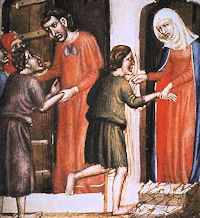
Daily Readings for: June 10, 2013
(Readings on USCCB website)
Collect: O God, from whom all good things come, grant that we, who call on you in our need, may at your prompting discern what is right, and by your guidance do it. Through our Lord Jesus Christ, your Son, who lives and reigns with you in the unity of the Holy Spirit, one God, for ever and ever.
Ordinary Time: June 10th
Monday of the Tenth Week of Ordinary Time
Old Calendar: St. Margaret, Queen of Scots, widow; (Trad) St. Landericus
St. Landericus was the Bishop of Paris from 650 to his death. He is best remembered as the founder of the first hospital in Paris.
According to the 1962 Missal of Bl. John XXIII the Extraordinary Form of the Roman Rite, today is the feast of St. Margaret of Scotland. In the Ordinary Rite her feast is celebrated on November 16.
St. Landericus
St. Landericus was a sincere and dedicated servant of God who, like his Lord Jesus Christ, had great love for the poor and the lowly. He became bishop of Paris in 650 A.D., in the Frankish kingdom (formally Gaul) during the reign of Clovis II and served as bishop until 656 A.D. (some records show until his death in 661).
He was a very earnest and devout man, and distinguished especially by his great love of the poor and by his charity during the famine of 651 A.D. To relieve them, during a time of famine he sold not only his personal possessions but also some of the vessels and furniture of the church.
He became increasingly aware that the sick and poor of disease were not really cared for by the custom then in vogue of housing them in little hotels dependent on the casual aims of charitable persons. For this, it was attributed to him was the foundation of the city's first real hospital, dedicated to St. Christopher, erected near Notre-Dame on the site of the dwelling place of Erchinoaldus, mayor of the palace In time, this became the famous Hotel-Dieu.
He was also responsible for the Benedictines' setup of the Abbey of Denis and in 653 AD, he signed along with 23 other bishops the foundation charter granted by King Clovis to the Abbey. He ws buried in the church of Saint-Germain-des-Pres, then called Saint Vincent's, where his relics, except two bones given to the parish of Saint Landry in 1408, are kept in a silver shrine. He is honored with an office in the new Paris Breviary. There is a statue of St. Landry, behind the alter of the Church of St. Landry in Opelousas, Louisiana. It appears to be that of a bishop, holding or distributing some bread or food. His feast day is June 10th.